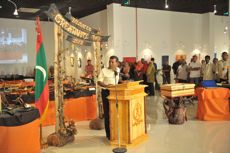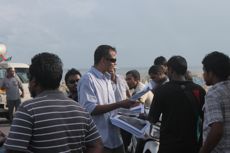Police have escorted a sheikh from the island of Maafushi in Kaafu Atoll on Sunday, after 300 protesters gathered outside his private Quran and Tawhid classroom and demanded that he leave the island.
Multiple sources from the island previously expressed concerns about a Sheikh Ibrahim Rasheed, originally from the island of Thulhaadhoo in Baa Atoll, who has been preaching in Maafushi for just over a year. He is alleged to have been “spreading hatred and strife on the pretext of preaching Islam”.
The Maafushi School and Pre-School voiced concerns that a number of students had been pulled from school by their parents over the playing of nursery rhymes and the lack of gender segregation. School officials have since said that some of these students had been made to attend the Sheikh’s private Quran and Tawhid classes instead.
After recent wide coverage of the issue in local media, residents of Maafushi staged a protest in front of Sheikh Rasheed’s private class “Thahseenul Quran” on Sunday evening.
Vice President of the Maafushi Island Council, Majdha Ibrahim said that approximately 300 people had joined the protest, demanding that the Sheikh “immediately leave Maafushi and stay away.”
According to Majdha, some of the chants the protesters shouted included “Stop creating strife with your twisted words”, “Stop distorting religion to take away our unity” and “Our daughters have a right to education”.
“Yesterday, the council received letters from both the preschool and the school, expressing concern that this man’s preaching was leading to parents who abide by him to take their children out of school. We haven’t received any official complaints about him previously, though we have heard residents voicing concern and disapproval about how his actions are leading to strife in a previously peaceful community,” she said.
Majdha confirmed that the Sheikh had been removed from the island around midnight on Monday with the assistance of a police response team from the capital Male’. Images on social media showed Rasheed wearing a helmet and police body armour.
“Sheikh calls us “ladhini” if we are not like him”
Maafushi Women’s Development Committee President Badurunisa Ibrahim alleged the Sheikh was creating a rift among the island’s citizens, claiming that he was converting more and more people to join his “more extreme version of religion” and forcing them to abide by rules he defined.
“He has been preaching to those who listen to him that playing nursery rhymes in preschool is the same as playing music, which he claims is haram. He has been advising parents to not let girls and boys mix together in school, saying it is anti-Islamic. This is leading to parents taking their kids out of school, which is so very worrying,” she said.
“He initially came to teach Quran at the Children’s Centre here, and then when he got fired, he started teaching private Quran and Tawhid classes. It seems ridiculous that he convinces parents to take children out of school as they are not gender segregated, and then himself proceeds to hold mixed classes for all ages,” she alleged.
Confirming that hundreds of angry protesters had gathered last night, Badurunisa asserted that people were voicing out against the Sheikh only because he was preaching a “twisted and misleading version of religion” and aiming “to create unrest” by forming factions among the people.
“Had he been just here teaching in his private Quran class or preaching actual Islam, none of us would have a problem with him. But when he is outright lying and distorting Islamic values, and brainwashing some people of our island, our community will not simply stand by and watch,” she said.
Stating that the protest had not been against “Islam”, but against abusing religion as a tool for discord, Badurunisa detailed some of what Sheikh Rasheed has been preaching on Maafushi.
“You’ve heard of his hypocritical stance against gender segregation. Besides that, he says that a man’s prayers will not be acceptable unless they are dressed in the Arabian style, salwar kameez. He also preaches that only kafirs do not grow their beards long, that it is haram to wear a necktie, and other such things which I don’t believe are in accordance with actual Islamic values,” Badurunisa said.
“When it comes to females, he speaks strictly against educating girls, or women having careers. He has also said that girls should not be able to participate in our local Quran recitation competition as a female’s voice itself is ‘aurah’ [Islamic term for parts of the body required to be concealed in order to maintain modesty],” she continued.
“He calls any of us who do not dress like him or act like him to be ‘ladini’ [irreligious] or kafir,” she said.
Meanwhile, Kaafu Atoll Council member Ali Shaheen has said that it is of utmost importance that the state finds a solution for similar problems.
“I think a solution for this can be found only when the State begins to take action against people like this Sheikh through the Religious Unity Act. This Act says, in no uncertain times, that it is against the law to create disunity by using religion as a tool. I call upon all relevant actors to view this as a serious issue and take meaningful action to prevent further incidents of this kind,” he said.
“Not a Sheikh, we brought the teacher to safety”: police
 “He is not a Sheikh, he is just a teacher who runs a private Quran class in Maafushi,” said a police media official, requesting to not be named.
“He is not a Sheikh, he is just a teacher who runs a private Quran class in Maafushi,” said a police media official, requesting to not be named.
“All that the protesters demanded was that the teacher be removed from the island. Keeping in mind the recent violent act against a teacher, we responded to the matter and safely brought him to Male’. He was not taken under our custody as such. Upon reaching Male’ we left him to his own resources,” the official stated.
“It’s his own words, we do not endorse them”: Ministry
Permanent Secretary of Ministry of Islamic Affair Mohamed Didi confirmed that they had knowledge of a sheikh creating problems in the island of Maafushi, and that the ministry had advised him against doing so.
“However, we cannot take official action against someone after hearing just one side of the story. We will need to find out what exactly he has been saying. This causes delays in taking action,” Mohamed Didi said.
“In the end, every Sheikh himself must take responsibility for the words he says. I don’t think anyone would have spoken against a Sheikh had they been preaching along Islamic principles. These preachings are his own words, and we do not endorse them,” he continued.
“For example, the issue of gender segregation. There are mixed co-ed schools across the country, even in Male’. The education system is under the Education Ministry. That is how things are and we do not involve ourselves in this,” he stated.
“Our ministry’s policy is to avoid any actions which may cause disputes.”

